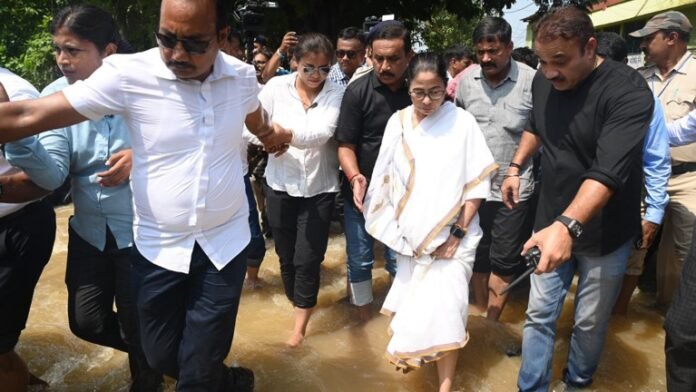West Bengal Chief Minister Mamata Banerjee, affectionately known as “Didi,” has launched a scathing attack on her Jharkhand counterpart, Hemant Soren, regarding the recent floods that have ravaged parts of West Bengal. As the monsoon season brought unprecedented rainfall to the region, leading to widespread devastation, the blame game between the two leaders has escalated, culminating in Mamata declaring the floods a “man-made disaster” and sealing the border with Jharkhand to prevent further complications.
The Flooding Crisis
The floods, which began earlier this month, have displaced thousands and caused significant damage to infrastructure and agriculture in West Bengal. Towns and villages have been submerged, with reports of people stranded and in dire need of assistance. As relief efforts ramped up, Mamata took to the media to express her frustration and seek accountability for the situation.
During a press conference, she stated, “What we are witnessing is not just a natural disaster; it is a man-made disaster resulting from negligence and mismanagement. We cannot ignore the role of Jharkhand in this crisis.” Mamata’s comments reflect her belief that the flooding has been exacerbated by poor planning and infrastructure issues in the neighboring state.
Accusations and Counterclaims
Mamata’s accusations center around the impact of deforestation and water management practices in Jharkhand, which she argues have led to increased runoff and higher water levels in West Bengal’s rivers. The Chief Minister has called for an immediate inquiry into the environmental practices in Jharkhand, urging Soren to take responsibility for his state’s actions.
In response, Hemant Soren has dismissed Mamata’s claims, stating that the floods are a natural phenomenon exacerbated by climate change and unpredictable weather patterns. He emphasized that blaming Jharkhand is an attempt to divert attention from the shortcomings of the West Bengal government in managing its flood response. “The monsoon affects us all, and it is irresponsible to politicize a natural disaster,” Soren stated in a press conference.
Sealing the Border
In a controversial move, Mamata announced the sealing of the border with Jharkhand, citing the need to control the flow of resources and prevent unauthorized entry of individuals from the flood-affected areas. “We need to prioritize the safety and security of our citizens,” she asserted, adding that the decision was taken to ensure that relief efforts could be focused solely on the residents of West Bengal.
This decision has drawn criticism from various quarters. Opposition leaders have accused Mamata of using the flood crisis as a political tool to bolster her image, while humanitarian organizations have warned that sealing the border could hinder relief operations and exacerbate the suffering of those in need. Activists have called for a more collaborative approach, urging both states to work together in addressing the disaster and providing aid to those affected.
Public Sentiment and Political Ramifications
As the political tit-for-tat continues, public sentiment remains a significant factor in the unfolding drama. Many residents of West Bengal are frustrated by the inaction of both governments in the wake of the floods. Local communities have mobilized grassroots efforts to provide relief to those in need, often stepping in where official channels have lagged.
In this context, Mamata’s government faces mounting pressure to deliver effective relief measures and address the immediate needs of the affected populations. The Chief Minister’s popularity has been built on her image as a champion of the common people, and any perceived failure to respond adequately to the crisis could have electoral repercussions in the upcoming state elections.
Looking Ahead
As the floodwaters begin to recede, the focus will inevitably shift from immediate relief to longer-term solutions for flood management and environmental protection. The need for cooperation between West Bengal and Jharkhand has never been more pressing. Both states must come together to address the root causes of such disasters, including climate change adaptation, sustainable land use, and improved water management practices.
In addition, the ongoing feud between Mamata Banerjee and Hemant Soren over the Bengal floods illustrates the complexities of regional politics in the face of natural disasters. While political leaders engage in a blame game, it is the citizens who bear the brunt of the impact. The need for collaborative governance and effective disaster management strategies is more crucial than ever as both states work to navigate the aftermath of this crisis and prepare for the challenges that lie ahead.

